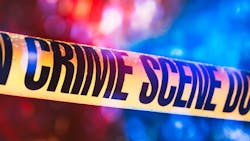Crime Scene Investigators have always taken extra, precautionary steps to avoid the possibility of becoming contaminated from a scene. With the COVID-19 outbreak, what has changed for investigators when it comes to safety precautions? Hardly anything at all. The standards being put into place for the public are the same precautions that have been used at crime scenes for years.
Limiting exposure
The amount of exposure to biohazardous material at a crime scene is extremely high. Even without a pandemic, added safety measures are always put into place. It’s already standard to have the basics such as wearing gloves at each scene whether you are processing, collecting, or cleaning it. When processing a crime scene, investigators are taught to take particular steps so as not to come into contact with hazardous or harmful material. These are set in place so that the investigator does not bring anything foreign into the scene either. The standard type of personal protection worn at a scene includes gloves, booties, and Tyvek suits. If the scene is particularly grim, added elements of protection such as respiratory masks, thicker gloves (or double gloves), and the habit of changing out booties every so often should be done.
Another standard piece of protective gear are N-95 masks. These have always been in crime scene kits, and have been used especially when processing part of the scene with fingerprint powder, other chemical-based latent print enhancers, or luminal. All of these protective barriers have been common at crime scenes for several years and the way to handle a scene presently, during the COVID-19 outbreak is exactly the same.
Clean-up safety
Standard practice for cleaning crime scene equipment and tools should be done as they always have. Not only should investigators wipe down evidence markers, rulers, and other equipment when used and taken into a scene, but they should also sanitize the surfaces and wherever evidence is placed for transport. This is done at all times to prevent cross contamination.
Investigators should also make it a habit to sanitize their units after evidence has been transferred. It’s good practice and helps avoid illness or the transference of any disease. The majority of the time, everyday cleaning products are used to sanitize equipment such as cleaning wipes, aerosol sprays, hospital-grade disinfectants, and bleach.
Transport and intake safety
Once the evidence makes it back to the PD, there still remains a risk of exposure or contamination. A few, additional, preventative steps that are taken include:
- Wear gloves when handling any type of evidence—whether it’s packaged or not
- Keep the evidence secure and in only one area of the vehicle
- Keep the evidence away from any other equipment used or may have already been cleaned
These guidelines are now being encouraged more but have essentially have been or should have been protocol all along.
Safety at all times
The preventative steps suggested to civilians and officers alike towards maintaining safety against COVID-19 are extremely similar to the procedures that were already put into place for crime scene investigators. It comes down to awareness. Investigators and officers have always been aware of how to handle potentially hazardous material and now the public has been made aware of that too. Keep in mind that every crime scene is filled with the unknown. Any public place should always be viewed whether you’re in law enforcement or not as the level of cleanliness remains unclear as well as what other toxic substances could be present. It’s a good reminder to stay cautious during this outbreak, but remember, the safety procedures are nothing to panic about—they have always been around.

Hilary Rodela
Hilary Rodela is currently a Surveillance Officer, a former Private Investigator, a former Crime Scene Investigator, and Evidence Technician. She worked for the Ruidoso (NM) Police Department as well as the Lubbock (TX) Police Department. She has written for several public safety publications and has extensive law enforcement and forensic training and is pursuing forensic expertise in various disciplines. Hilary is a freelance public safety writer and curriculum developer for the National Investigative Training Academy.



